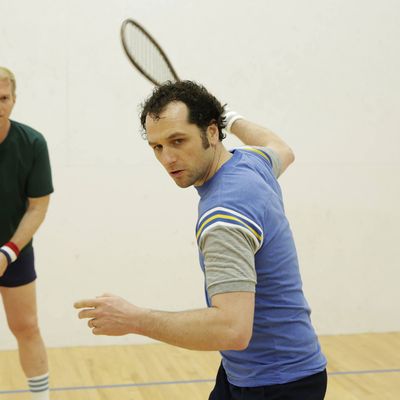
“You need to blink. I promise you it will be better if you blink.” Philip’s driving advice to Paige is played for comedic effect in “The Day After,” but the way it’s deployed — intercut with images of Elizabeth torpedoing her relationship with Young Hee in the name of her mission — gives the throwaway line some unexpectedly deep thematic resonance. In driving, as in spy work, it’s imperative to keep your eyes open and on the road ahead. But without the occasional respite that blinking provides, you risk doing extreme damage to yourself and others.
The idea of blinking — choosing to hesitate in the face of a decision — gets a lot of play in this episode, which draws from the 1983 TV movie The Day After for both its title and its emotional resonance. The story Oleg tells Tatiana about the Russian duty officer who ignored his training and sidestepped nuclear Armageddon directly addresses the idea a thin line exists between hesitation and clarity. William and Philip’s discussion about whether to tell the Centre about the newest heinous biological threat on Level 4 extends this idea, too. In certain cases, taking your eyes off the prize for a moment might be in everyone’s best interest. The “mutually assured destruction” approach works in theory, but also comes with a high risk of actual destruction on all parties’ parts. Whether it’s a bevy of nukes or a biological weapon that makes blood come out of your skin, the cards held by both parties have the potential to upend life as we know it. We just have to hope and pray that the individuals holding the cards know when to blink, when to not play their ace.
The Day After broke viewing records when it aired, and The Americans does an admirable job alluding to the TV movie’s cultural impact. When ABC first aired The Day After, its promotions posited the movie as a discussion-starter — which this episode nods at with footage of the warning message that preceded the movie — and followed the broadcast with a live debate on the subject of nuclear armament. The debate (which you can watch on YouTube if you need more nuclear-doomsday-related stress in your life) featured Carl Sagan, William F. Buckley Jr., Henry Kissinger, and Elie Wiesel debating nuclear proliferation, and is particularly notable for the metaphor Sagan gives for the state of the arms race: “Imagine a room awash in gasoline, and there are two implacable enemies in that room. One of them has 9,000 matches, the other has 7,000 matches. Each of them is concerned about who’s ahead, who’s stronger.”
Elizabeth and Philip (and William, for that matter) have been helping gather matches, so to speak, for their government for years, which naturally leads to some soul-searching in the wake of The Day After broadcast. Paige asks Philip how the work he and Elizabeth do factors into the events she witnessed on TV, and he insists — echoing the line he and Elizabeth fed Pastor Tim a few episodes back — that they are working to prevent those events. “Do you think it really makes a difference?” Paige asks him. Had she been having this discussion with Elizabeth, it’s safe to assume she would have been answered with a firm, resolute yes. But Philip’s waning confidence in his country and his mission means that the only answer he can truthfully give is, “I don’t know.”
Philip and Paige aren’t the only Jenningses feeling the effects of The Day After. Elizabeth is visibly moved by the TV movie, though it’s a little tougher to parse the nuances of her reaction. Clearly troubled, she receives Philip’s suggestion that maybe they shouldn’t tell the Centre about William’s latest bit of bioterror (which, in case you missed it, makes blood come out of your skin) with more understanding than she seemed capable of a season ago. But she’s still the resolute Elizabeth she’s always been, which means she viewed The Day After through a sharper lens than the perpetually conflicted Philip. “They are making that poison for us, to destroy us,” she tells him, calmly but with no room for argument. “We have to be able to defend ourselves.” Elizabeth will always be a match-gatherer, a believer in the idea of mutually assured destruction as a deterrent.
The narrative irony here is that Elizabeth must actively destroy something she cares about to help her country gain this theoretical upper hand. Philip suggests they don’t tell the Centre about what’s on Level 4 with the knowledge that doing so would also save Elizabeth from having to hurt Young Hee, the closest thing to a real friend she’s had. (Sure, Young Hee doesn’t actually know Elizabeth, but it’s hard not to read Elizabeth’s affection for the extremely likable woman as anything but genuine. She’s basically Elizabeth’s Martha, but without the tantric sex.) In the wake of their seven-month “vacation,” it’s tempting to think that Elizabeth may have reached the point where she values her friendship with Young Hee more than she values what she can get from Level 4 via Young Hee’s husband, Don. But that would be extremely uncharacteristic for Elizabeth, time jump or no.
Elizabeth briefly clings to the idea that there may be another avenue to Don than the one she knows she’ll eventually have to go down (i.e. Honey Pot Lane). When Philip points out that Don is “clean,” and that it may be hard to get to him, Elizabeth murmurs “You never know,” while fixing her hair in the mirror, hinting that she’ll likely have to seduce the man before extorting him into giving up the Level 4 access codes. But first, she spends an entire night rifling through Young Hee and Don’s belongings, looking for anything — anything — she could use to turn Don without betraying Young Hee. (More than she already has, anyway. Young Hee probably wouldn’t be too pleased to discover she let a lying stranger babysit her kids, spoiled brats though they may be.) All Elizabeth finds is a porno tape, which only serves to mock her discomfort over what she ultimately must do to Don and Young Hee.
Which brings us back to that scene of Philip and Paige in the Camero, which is intercut with “Patty” drugging Don in her perfectly appointed “1980s single gal” apartment. (Where does Directorate S get all these apartments? And who’s responsible for decorating them? I smell a spin-off webseries!) Peter Schilling’s “Major Tom” soundtracks the unsettling juxtaposition, with Paige and Philip engaging in an ultra-American bonding ritual as Elizabeth methodically goes about the dirty work of ruining Don’s and Young Hee’s lives. She doesn’t hesitate, but there’s no small amount of sadness in her actions, either. As she watches Don wake up, and realize what he’s done — or thinks he’s done, anyway — Elizabeth blinks, then closes her eyes in shame.
Later, at home with Philip, she cries.


